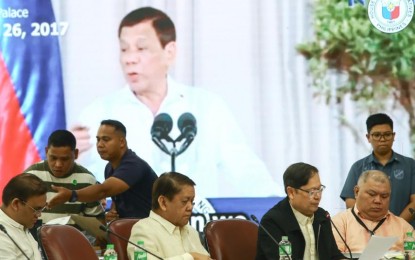
QUAD COM. Former Iloilo City mayor Jed Patrick Mabilog (3rd from left) delivers his opening statement during the House quad committee hearing on Thursday (Sept. 19, 2024). Mabilog, whose name appeared on former President Rodrigo Duterte narco-list, denied any involvement in illegal drugs. (PNA photo by Joan Bondoc)
MANILA – Former Iloilo City mayor Jed Patrick Mabilog on Thursday claimed that former President Rodrigo R. Duterte’s controversial narco-list was weaponized to target his political rivals.
During the House quad committee probe into extrajudicial killings, illegal drugs, and Philippine offshore gaming operators (POGOs), Mabilog, whose name appeared on Duterte's narco-list, said it became more of a "hit list" that is politically motivated and not based on evidence.
"Kung inyong titingnang maigi, isinama ang mga pangalan ng kalaban sa pulitika sa isang validated list ng mga drug personalities sa kasunod na PRRD list. Sa kabila ng mga kuwestiyunableng impormasyong, walang validation o confirmation man lang na ginawa ng kahit na anomang ahensya ng gobyerno sa Malacañang initiated list. Itong PRRD list diumano ay naging isang 'hit list' (If you will look closely, the names of political opponents were included in a validated list of drug personalities in the subsequent PRRD List. Despite questionable information, no validation or confirmation was done by any government agency on the Malacañang-initiated list. This PRRD list allegedly became a 'hit list')," Mabilog said in his opening statement.
Mabilog, who returned to the country after seven years of self-imposed exile in the United States, denied any involvement in illegal drugs.
“Una po sa lahat (First of all), I declare that I was not and never will be a drug protector! I don’t know personally nor did I benefit in any way from any illegal drug personality in Iloilo or anywhere else,” he said, noting that no drug-related cases were filed against him until now.
He said he actively pursued anti-drug campaigns during his tenure as mayor, noting that under his leadership, Iloilo City became the first city in the Philippines to have 100 percent of its Barangay Anti-Drug Abuse Councils (BADAC) activated in 2014.
He, however, said all these efforts were ignored by the Duterte administration following his inclusion in the narco-list.
Mabilog recalled how threats against him escalated, eventually forcing him and his family to self-exile.
"Paulit-ulit ang pagbabanta ni Presidente Duterte sa media, harap-harapang sinasabi na ipapa-patay daw ako ([Then] President Duterte repeatedly threatened the media, openly saying that he would have me killed)," Mabilog said.
He particularly recounted a chilling experience in 2017 when he got a call from then Philippine National Police (PNP) Chief Ronald Dela Rosa, inviting him to Camp Crame.
"At around 5 p.m., a PNP colonel called me and in a voice that sent shivers down my spine warned me not to go to Camp Crame because my life was in danger," Mabilog said.
Later that day, Mabilog’s wife received a text message warning them that men were reportedly surrounding their home and were prepared to kill him if he will go to Camp Crame.
Mabilog said he again received a call from a “general” who again warned him not to go to Camp Crame.
“Mayor, do not return. Your life is in danger. The accusations against you are all fabricated. But if you go to Crame, you’ll be forced to point fingers to an opposition senator and a former presidential candidate as drug lords,” he quoted the caller as saying.
"The terror was paralyzing. I couldn’t believe it – my life was hanging by a thread," Mabilog said.
He and his family fled to Japan and later to the United States, where they were granted political asylum.
While in Japan, Mabilog received a call from Dela Rosa, who expressed sympathy and told him he knew Mabilog was innocent.
However, another general soon warned him not to return to the Philippines.
Mabilog said law enforcement agencies were being used to serve political purposes, which erode public trust in the government.
"Using state institutions to carry out personal vendettas or silence perceived enemies undermines the foundation of justice and democracy in our country," he said.
Mabilog called for reforms within law enforcement agencies to ensure they are not manipulated for political gain.
“No individual should be able to wield such unchecked authority regardless of their position or power,” he said.
He said accusations must be duly validated and authenticated first before any public announcement to avoid shaming and destroying the honor, reputation, and good image of a hardworking and innocent person. (PNA)
